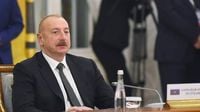As Russia prepares to commemorate the 80th anniversary of Victory Day, President Vladimir Putin has embarked on a series of high-profile meetings with foreign leaders arriving in Moscow for the celebrations. This year, approximately three dozen heads of state and government are expected to attend the events, including significant figures from Latin America, Asia, and Africa.
On May 7, 2025, Putin met with Venezuelan President Nicolas Maduro, where they discussed enhancing economic ties and global issues, culminating in the signing of a strategic partnership agreement. This meeting marks the beginning of a busy diplomatic agenda for Putin, who is set to engage with several other leaders in the days leading up to the Victory Day parade on May 9.
On May 8, Putin is scheduled to hold talks with Chinese President Xi Jinping, a key meeting that analysts believe will focus on economic cooperation, particularly regarding a long-discussed gas pipeline project from Russia to China. The discussions may also touch upon collaboration within the BRICS framework and the ongoing situation in Ukraine, especially with Brazilian President Luiz Inácio Lula da Silva also in attendance.
Additionally, on May 9, Putin plans to meet with leaders from Uzbekistan, Serbia, and the Republic of the Congo, followed by five bilateral meetings on May 10 with leaders including the General Secretary of the Central Committee of the Communist Party of Vietnam, To Lam, and the head of Zimbabwe, Emmerson Mnangagwa.
To honor the visiting dignitaries, Putin will host a grand reception on May 8, which will include a concert and an official dinner. While specific details of the menu have not been disclosed, past receptions have featured dishes such as smoked duck salad, crab and scallop coquilles, and beef steak with pepper sauce, showcasing Russian culinary traditions.
In previous years, Putin has also introduced foreign leaders to Russian culture through events like ballet performances. However, it remains uncertain if similar cultural activities will be included this time around. Political analysts suggest that the Kremlin may organize additional informal gatherings to express gratitude to the leaders for their attendance, particularly during such a significant occasion.
Despite the high-profile guest list, not all leaders will attend the celebrations. Azerbaijani President Ilham Aliyev has opted to remain in Azerbaijan for internal commemorative events dedicated to Heydar Aliyev, as explained by Yuri Ushakov, a senior aide to Putin. This decision has raised eyebrows, with some speculating that Aliyev's absence could be politically motivated, especially given the recent tensions between Azerbaijan and Russia following a plane crash incident involving Azerbaijan Airlines.
Aliyev has demanded accountability from Russia regarding the crash, which he claims was caused by ground fire and electronic warfare. The Russian government has expressed its commitment to a thorough investigation, but Azerbaijan has deemed this response insufficient, leading to strained relations.
Moreover, the President of Laos, Thongloun Sisoulith, will also miss the parade due to health concerns related to COVID-19, with the Laotian delegation being represented by its Minister of Foreign Affairs instead. In contrast, Kazakhstan's President Kassym-Jomart Tokayev has confirmed his attendance at the events, expressing his eagerness to participate in the celebrations.
As the week unfolds, Putin's schedule is described as a "never-ending and very important political marathon," as he engages in discussions that could shape future international relations. The significance of Victory Day, commemorating the defeat of Nazism, remains a cornerstone of Russian national identity, and this year's events are expected to emphasize both historical remembrance and contemporary geopolitical dialogues.
With leaders from various nations converging in Moscow, the celebrations not only serve as a tribute to the past but also as a platform for addressing current global challenges. The outcomes of these meetings could have lasting implications for Russia's foreign relations and its role on the world stage.
As the world watches, the Victory Day events in Moscow are set to be a focal point of international diplomacy, showcasing Russia's efforts to strengthen alliances and navigate complex geopolitical landscapes amidst ongoing global tensions.


